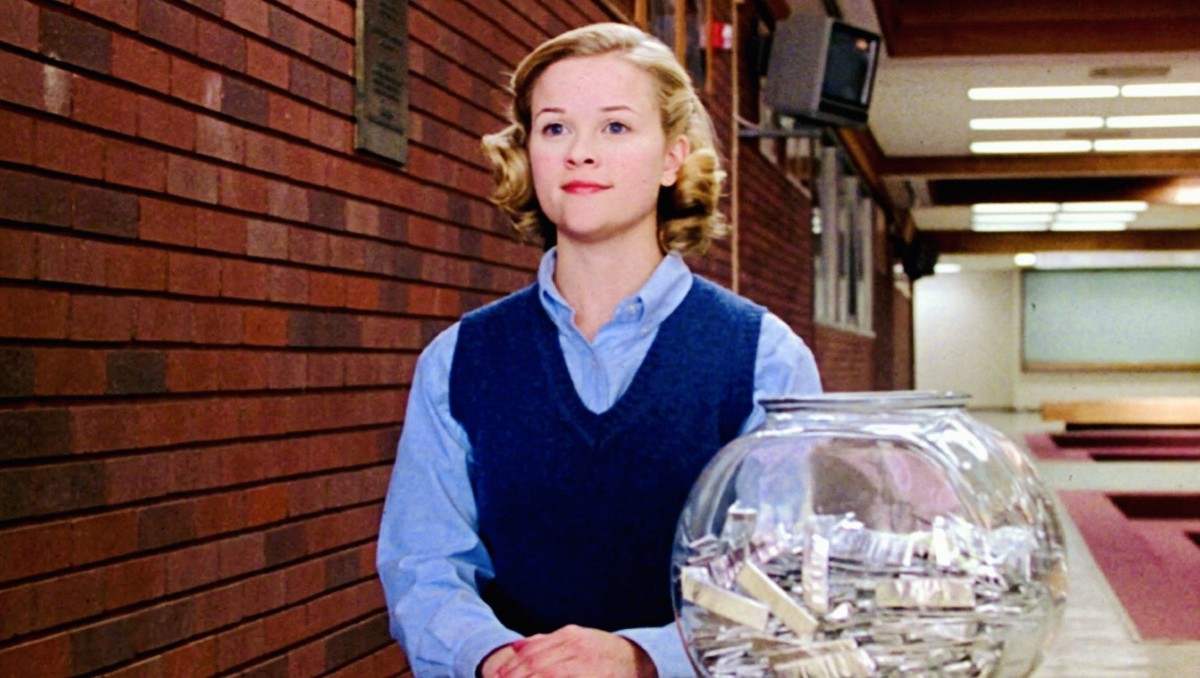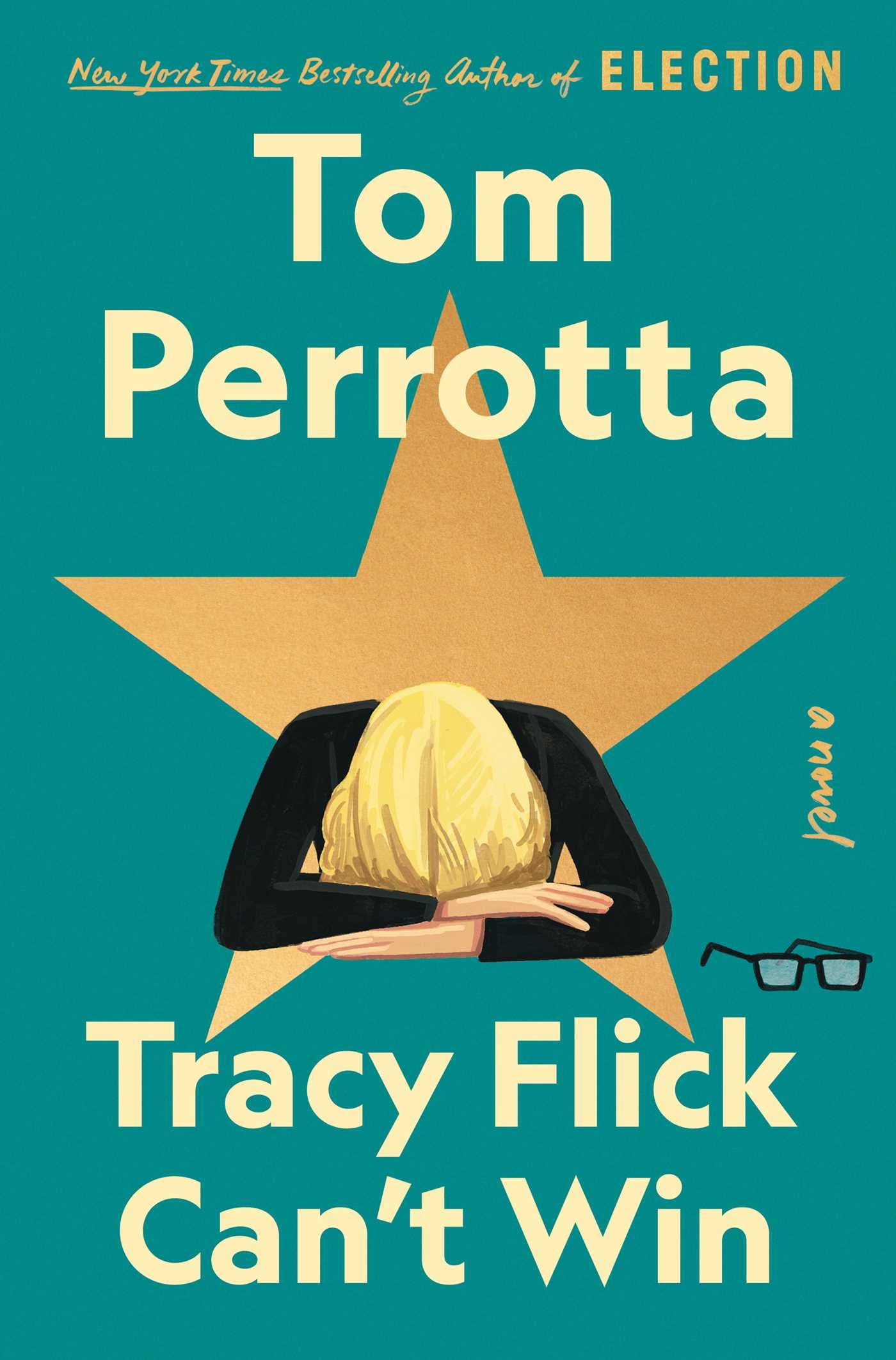
Reese Witherspoon in a still from Election (1998)
In this #MeToo-inspired novel, a pivotal American figurine finds her clemency
“Vito didn’t believe in love at first sight. He wasn’t even sure he believed in love, period, though he’d said, I love you, multiple times to all three of his wives […] and to a few other women as well.”
Along with reading this spectacular novel, I also tried a media experiment. Reese Witherspoon would go on to win an Oscar for her portrayal of June Carter Cash — wife of a famous Cash (2006) — but imagine a comic actress winning an Academy Award! We’re looking, of course, past the nimble frame of “Women’s stories matter, they just matter”-spouting Witherspoon, to Marissa Tomei.
Now starring as Peter Parker’s aunt (May) in the third iteration of the Spider-Man movie franchise, she won it for her bon vivant portrayal in My Cousin Vinny (1992), which also stars Ralph Macchio, whose beloved The Karate Kid (1985) makes a delightful return as Cobra Kai (2018) on Netflix. It’s raining refurbished storytelling. The media experiment I tried is peculiar to and borne out of my watching and reading habits, where, as an adolescent, I preferred to read books which had already been adapted to feature-length films, in order to enable me to visualize and trod along better. Gradually, through years of experiment, I perfected a personal system, an idiosyncratic barometer of characterization excellence: if the author couldn’t convince me that the picturized characters were any different from the ones on paper, it was probably a poor novel.
I applied the same test to this novel, and Reese Witherspoon, who portrayed the titular character in the 1998 adaptation of the first book in the series, both titled Election, with such gusto, vanishes. In her place is, I beg your pardon, Holly Hunter. I just couldn’t picture it otherwise. Blame it on her most recent portrayal as an ambitious, if wronged, fifty-something in HBO’s Succession — it fit perfectly. So, imagine Holly Hunter, who also voiced Pixar’s chirpy Mrs Incredible, in ennui, in honeyed ravaging, in an inverted noose around her collar as the Assistant Principal of a local high school. Both Election and …Can’t Win are stationed firmly in tight rooms of this most happening place. The school. The humble intersection of adulthood and children, of precocious children and timid, vulnerable adults, and the setting for the juiciest fiction, maybe of all time. Enter a race for the post of Principal. Enter also vengeful and regretful adults. Enter teenage romance. The whole nine yards.
This is the story of a hero losing. The hero is Tracy, and she’s in disgrace. Her mother has passed away. She is as far away from being a President — the national kind — as anyone else could be. She’s a second-in-command. And, now, in disagreement with her teenage self about whether she had been sexually assaulted.
If you read the first book in the series or watched the immensely piquant film, also starring Ferris Bueller’s Matthew Broderick, you’d know that Tracy was a victim of sexual assault, although she doesn’t know it, or is aware of it, wearing it more like a badge of eventfulness, or an undeniable claim to precocity. You see, teenage Tracy was all about that life. Being overperforming doesn’t even cut it: this child was outstripping the wildest expectations of academic or extracurricular brilliance by more than a boat length. Cut short by the pettiness of a high school teacher, who hated her guts so much he committed (school-level) election fraud, and lost his job in the process. The adult Tracy is addressed as Doctor Flick, and she’s this petty high school teacher again. Except here, the years have taken a toll on her ambition, and she’s having none of it.
Along the way are so many indelible characters. This novel is a veritable Russian roulette of perspectives, as it switches from regretful adult to another . . .regretful adult, to a closeted teenager, and then to an adulterous old Principal, then a vengeful policeman, and a disgruntled, disillusioned former star athlete. All of them are tied together by their association to this most prickly high school, and are doomed as should be the most logical consequence. And Perrotta does the switcheroo so skillfully, so daintily. Notwithstanding that most often, the perspective is stated at the top of the page with the name of the character, I could wager my copy of this book that I wouldn’t be lost even if that wasn’t the case. Such is the range in vocal cues and pet peeves.

Tracy Flick Can’t Win: A Novel
By Tom Perrotta
Scribner,
pp. 272, $13.99
It is also riotous in its humour. So observant, so layered . . .the hilarity is both overlaid — a grown woman lurched into a personal storm! Driven to gate-crashing parties to make a point! — but also scattered through the pages like salted cinnamon.
But its most poignant rumination is about the nature of regret. Of realizing stuff a little too late, of not helping someone and sending them off a fatal path, of missing out on a guilty pleasure, or just being a douchebag when one could very easily avoid it. So much to unpack! And all of them are in their middle age, or upwards. There is Tracy, the shining favourite of her high school, now reduced to dust. She has nosebleeds while having a sauna, and can’t call her daughter her child. She’s the epitome of shooting for the moon and missing it, left to writhe in the suffocating company of stars. She left her law school degree in the middle of it all. She’s only now realizing she might’ve been a victim after all this time, and maybe the feeling of being an adult that she felt, thanks to her overachieving candour, was just a mirage. She can only fail is my guess. The novel concludes in a way all Perrotta’s works do — if you know, you know, and seals my faith that this is Flick’s own manifesto.
There is Vito Falcone — famous star athlete of the school — who didn’t make it big in the professional leagues, and is now on the road in a forgiveness-seeking spree, knocking on the doors of all the women he’s shared a bed with, and all the men he’s ridiculed to bawling, tangled messes. He carries a list and crosses names off, and has memory loss when he can manage it.
There is the pernickety Principal, old in his bones and of a weak heart, whose loins hum to a forbidden rhythm. Should he be happy about his wife making it through her almost-fatal cancer? What about his side fling? That was so good. In fascinating scenes of early morning, he drives around in his overly large vehicle on silent roads, and has epiphanies about being old, and how similar it is to waiting for a way onto a rapidly-speeding highway.
And it keeps switching. The same scenes assume finality, weight, and humour, as peels of perspectives gauze them, like the wounds of an ego hurt.
Regret is such a powerful feeling, especially when you can see it in your loose folds of skin, in rolls of fat, in suede that’s curdling. When one stands up and assaults one’s wife, then springing back, hand on lip, brows into the hairline, shocked at an inebriated step. Standing with one’s hands in one’s pocket, flicking back one’s slightly greasy hair, and the fingers clasp on a worn high school badge, as lush green conceals a forking of lifetimes. When one squanders their greatness at the altar of crude sentimentality, that most basic of emotions, and indeed, the basis of emotion itself, and wails in despair after decades have pressed their hair to their skin.
When your office is smaller than you dreamt it to be, and the lights a little yellower, and the flies a little bluer. You can’t realistically atone for any of it. You can try, yes, but to what end? Flick is a self-admitted loner, says she can’t make friends, and maybe she never had the penchant for it. She’s around forty, so boohoo, who cares? But then again, she says, in the Epilogue, that it’s such a wonderful gift to have friends. There’s so much emotion that Flick learns to acclimate to, and if the novel was just about how an uptight administrator learns to smell the marigolds, it’d have been worth it.
Some characters are false notes, I have to admit. I liked how they populated the world of the novel, leavening out the nagging reality of Tracy Flick, but I often thought they were just that — leavening. But who cares about that. Because Perrotta clearly aims them to be plot vehicles, heightened by the switcheroo, where a narrative thread drops in a vehicle — in one case a hormonal teenage boy, who drives by in a car — and this vehicle soldiers it to another. Some critics make too fine a point about loose threads in novels. I digress. No good novel can claim to tie all loose threads, and certainly not one as messy, as perfect, as this one.
What a glorious piece of zeitgeist fiction.
More from The Byword
Comments
*Comments will be moderated











